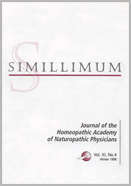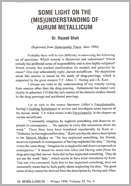Some Light on (Mis)Understanding of Aurum Metallicum
Aurum metallicum article
One of the adverse effects of our enhanced understanding of some of the remedies is that we have unknowingly introduced baseless data into the materia medica. This eye-opener article probes into this risky trend.
Probably, there will be less difficulty in answering the following set of questions:
- Which remedy is dictatorial and industrious?
- Which remedy has a profound sense of responsibility and is also highly religious?
- Which remedy has marked amelioration (in mental and general symptoms) by music?
One may unhesitant reply: Aurum Metallicum. My skepticism about this answer is based on the study of the drug-proving, which is supported by literature by T.F. Allen, C. Hering, and J.T. Kent.
I always see risk in the understanding of any remedy arising from sources other than drug-proving. Hahnemann has clearly stated in aphorism 110 that the only source of the materia medica should be drug-proving and accidental proving, but nothing else.

Let us turn to the source literature (Allen's Encyclopedia, Hering's Guiding Symptoms) to review and investigate some aspects of Aurum's mind.
T.F. Allen writes in the Encyclopedia under the chapter of Aurum Metallicum: Constantly imagines he neglects something and deserves reproach in consequence... He appears to carry this uneasiness about the mind. These lines have been translated repertorially by Kent as: Delusion, he has neglected his duty. Kent re-writes the above description in his Materia Medica as He has neglected something, his friends deserve reproach in a consequence of having neglected his duty. Hering writes the same thing: Imagines he is neglectful and deserves reproach in consequence. It should be noted that Allen and Hering state (from the Drug-proving) that Aurum feels that he has neglected something. They do not use the word 'duty', which seems to be introduced by Kent. One who constantly feels that he has neglected something does not necessarily mean that he feels guilty about neglecting his duty. The great sense of duty cannot be derived from the description by Hering and Allen. The sense of guilt cannot be overemphasized in Aurum, as the term guilt is used neither by Allen nor Hering. Kent seems to have used the word 'duty' quite casually, as any teacher would probably do, but I wonder how he gave the highest grade to Aurum in the rubric: Delusion, neglected his duty: AUR., lyc., cycl., hyos., puls.
Self-reproach does suggest a sense of guilt in Aurum. But, it does not essentially mean guilt about neglecting his duty.
An understanding of Aurum Metallicum as that of being dominating or dictatorial personality has no support from any source. T.F. Allen, Hering, and even Kent do not use the term dominating or dictatorial. J. Kunzli has admirably located and very nicely corrected the printing error in Kent's repertory and replaced Aurum by Apis mellifica. It should always be questioned how the idea of dominating personality erupted in Aurum metallicum.
Another mysterious entry in the repertory for this remedy is 'Industrious'. Again, none of the above sources describes the state of being industrious or hard work in Aurum. Kent does not discuss anything featuring the hard-working nature of Aurum, in his materia medica. Amazingly, he has entered Aurum in bold capitals under the rubric 'Industrious'. Possibly, a printing error. (It will be interesting to note that a similar thing has happened with the rubric: Remorse, where you find Coffea in bold capitals but do not find similar description in Kent's Materia Medica.)

Allen, Kent and Phatak do not describe the well-known religiousness in Aurum. Drug provers of Aurum did not produce any religious feelings. Hering puts it: Religious mania. It seems that the current understanding of Aurum as Religious is overstretched from Hering's remark.
Once I was discussing with George Vithoulkas this aspect of Aurum. He said it very clearly that Aurum has a 'Desire to Pray' and not 'religious'. The difference is obvious between 'Praying' and 'Religious'.
Would it not be quite sad to discover that Aurum Metallicum mind is not better by music? Allen, Hering, Kent (Materia medica), Boericke, and Phatak do not give the symptoms: '> Music' or 'Sadness > Music'. Please go to the text to discover it yourself. Kent writes under Aurum while describing the ear pathology: 'Oversensitive to noise but music relieves' (Page: 198). And further, he discusses more of the ear sensitivity symptoms. It sounds that '> Music' is purely a local ear symptom and not a mental characteristic. This is an example of our tendency to stretch the symptoms up to the extent of its distortion.
Who would not be upset by discovering that Aurum does not have a sense of responsibility? I, too, was taken aback when I found it myself. I had even treated some cases successfully considering this aspect of Aurum! But the facts have to be accepted as facts. Aude sapere!
The so-called sense of responsibility in Aurum is not found in the work of Allen, Hering, Kent, Boericke, and Phatak. Kent mentions in one place: "The causes of this state of insanity are prolonged anxiety, unusual responsibility, syphilis, and loss of property." He never described anywhere in the materia medica about any sense of responsibility in Aurum. He has just stated some causes of insanity and included 'unusual responsibility' as one of them. Very logically, such casual indication (which has no relevance to the drug proving) cannot be generalized. Phatak has taken up these two words 'Unusual responsibility' in his materia medica and generalized them as 'Unusual responsibility, AGG.' in his repertory. (Pg.292) It should also be noted here that Phatak did not describe this feature under the mind section. Somehow, those two words are responsible for this grave misunderstanding of the remedy. Any description indicating the sense of responsibility in Aurum does not originate from Hahnemannian proving.
The picture of Aurum described by Kent is that of a person who has perverted affections: 'The fundamental love, which is the love of living, of self-protection, is perverted and he loathes life, is weary of life, longs to die and seeks methods to commit suicide.' All the negative emotions such as self-contempt, loathing for life, suicidal thoughts, hopelessness, hatefulness, quarrelsomeness, violence, sadness, etc. are filled in Aurum, rather than positive emotions such as a sense of responsibility, positivity, industriousness, etc.
This incisive study on Aurum throws a warning light on how any remedy could be misunderstood and distorted when not studied in coherence with the drug proving. It also alarms as to how not to form images of homeopathic remedies based on some vague clinical/empirical symptomatology; not found in the drug-proving.
I would also like to point out to our learned readers that the understanding of the materia medica based on mere personal experiences but without its basis in the drug-proving may turn out to be dangerous. I strongly feel that the time has come to a stop passing on distorted understanding to the next generation.